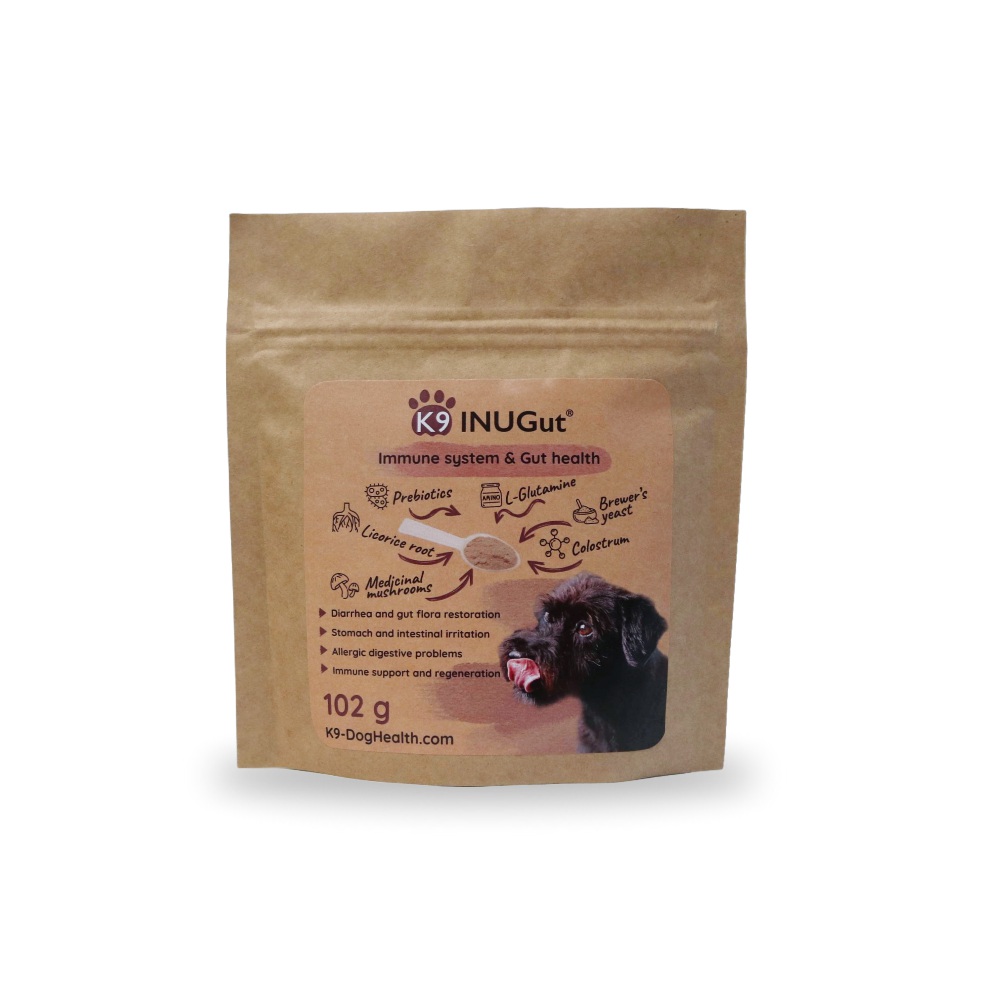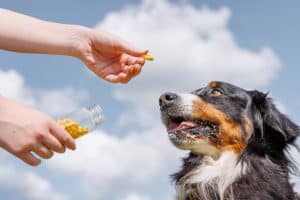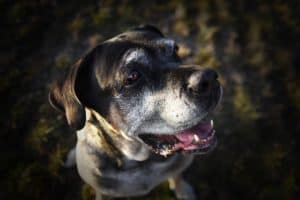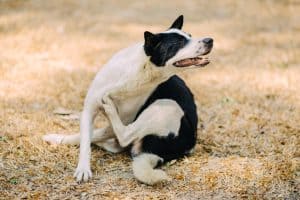Dog diarrhea – Causes, treatment, prevention and natural support
Dog diarrhea is one of the most common issues you may face as a pet owner. Sometimes it’s just a simple digestive upset, other times it signals a more serious cause. Diarrhea can quickly lead to dehydration, especially in puppies and senior dogs, so it’s important to understand the causes, know when to see a veterinarian, and how to naturally support gut flora and the intestinal lining.
Dog diarrhea – The most common causes
Many factors can trigger diarrhea: dietary mistakes, sudden food changes, table scraps; food allergy or intolerance, often accompanied by itching and skin issues; parasites and bacterial infections; gut flora damage after antibiotic treatment; stress and environmental changes; age-related digestive issues due to reduced enzyme production and motility.
Among viral causes, parvovirus is one of the most dangerous, causing severe, often bloody diarrhea and rapid dehydration. Early signs include lethargy, loss of appetite, vomiting, followed by foul-smelling, bloody diarrhea. Parvovirus requires immediate veterinary care.
Canine diarrhea with vomiting
If diarrhea is accompanied by vomiting, it may indicate a more serious problem, such as infection, poisoning, or severe enteritis. This condition leads to rapid dehydration, making urgent veterinary examination necessary.
Dog diarrhea – What stool color and consistency reveal
The color and texture of a dog’s stool can provide important clues about what is happening in the digestive system. While it never replaces veterinary diagnosis, careful observation can help detect issues early.
- Yellow or light stool: often indicates digestive issues, liver or pancreatic problems.
- Green stool: may occur after eating grass, but can also suggest bile irritation or rapid intestinal transit.
- Black, tarry stool: signals digested blood and requires urgent veterinary care.
- Bloody stool: usually originates from the colon or rectum.
- Mucous stool: indicates colon irritation.
- White fragments: may be worm eggs or worm segments.
Home care for mild cases
If the dog is active, drinking water, and has no fever, mild cases may improve with a bland diet and rest. Feed small portions of boiled rice and chicken, and provide fresh water. Do not give dairy products, spicy food, or human medication, as these can worsen the condition.
Dog diarrhea and dehydration
One of the biggest risks of diarrhea is dehydration. Signs include inelastic skin, dry gums, sunken eyes, and lethargy. In puppies and senior dogs, dehydration develops quickly, so fluid replacement is critical.
Gut flora – Immune system connection

When gut flora balance is disrupted (for example due to antibiotic treatment, infection or stress), it can cause not only digestive problems but also inflammation and immune dysfunction. This explains why gut issues are often linked with itching, allergies, or even autoimmune conditions.
Research shows that the health of the microbiome plays a key role in chronic enteropathies (long-term gut inflammation), food allergies, and weakened immune response. Supporting gut flora through pre- and probiotics, colostrum, and mucosa-protective compounds can help not only stop diarrhea but also improve overall health.
Dog diarrhea – Chronic enteritis (IBD) and food allergies
Chronic enteritis, also known as IBD (inflammatory bowel disease), is one of the most common causes of recurrent diarrhea in dogs. It’s a complex condition where an excessive or abnormal immune response causes persistent gut inflammation. Genetic predisposition, gut flora imbalance, and environmental factors may all play a role in its development.
Symptoms of IBD include chronic diarrhea, weight loss, loss of appetite, bloating, vomiting, and sometimes bloody or mucous stools. The disease drains the dog over time, reduces quality of life, and often follows a relapsing course.
Food allergies can also cause persistent or recurrent diarrhea. In this case, the dog’s immune system reacts excessively to certain proteins (such as chicken, beef, dairy), leading to digestive issues. Common accompanying symptoms are itching, ear infections, and skin inflammation. The exact trigger can only be identified with an elimination diet, where the dog is fed a new, simple diet for several weeks.
For both IBD and food allergies, supporting gut flora is crucial. Proper prebiotics, probiotics, and mucosa-regenerating compounds help reduce inflammation, restore the gut barrier, and improve nutrient absorption. Complex, natural supplements can therefore play an important role in therapy.
Puppy diarrhea
In puppies, diarrhea is especially dangerous because their small bodies dehydrate very quickly, leading to a life-threatening condition in a short time. Puppies have immature immune systems and less stable gut flora, making them more sensitive to infections and dietary mistakes.
Diarrhea lasting more than a day, lethargy, vomiting, fever, or refusal to drink requires urgent veterinary care. One of the biggest threats is parvovirus, which often causes bloody, foul-smelling diarrhea and, without proper treatment, can quickly be fatal. Early recognition of signs – such as loss of appetite, lethargy, repeated vomiting – can literally be life-saving.
Prevention is key: regular and timely vaccinations provide the best protection against parvovirus and other infectious diseases in puppies. It’s also important to avoid contact with unknown, unvaccinated dogs and contaminated environments.
Senior dogs and digestive issues
Senior dogs’ digestion naturally changes with age. Gut flora composition shifts, with beneficial bacteria decreasing and less favorable strains increasing. Digestive enzyme production also declines, making nutrient breakdown less efficient. Regeneration of the intestinal lining slows down, making the gut more fragile.
As a result, older dogs are more prone to recurrent diarrhea, bloating, loss of appetite, and poor nutrient absorption. Over time, this can lead to weight loss, weakness, and a weakened immune system. In such cases, gut flora support and providing easily digestible, high-quality food is especially important.
Prevention in everyday life
Choose high-quality food; introduce new diets gradually; ensure regular deworming; reduce stress; and maintain a stable routine. In summer, make sure food does not spoil in the heat, and do not let your dog drink from puddles or contaminated water. Ongoing gut flora support is one of the foundations of prevention.
Dog diarrhea and antibiotic resistance
Unnecessary or excessive use of antibiotics disrupts the balance of gut flora and may contribute to the development of antibiotic resistance. This poses long-term risks not only for dogs but also for public health. Protecting the microbiome during every treatment and complementing veterinary therapy with targeted gut flora support is essential, especially after an antibiotic course.
What does science say about natural support?
Clinical studies show that several natural ingredients support dogs’ gut flora and immune system, which makes them valuable in both acute and chronic cases. Probiotics in dogs with chronic enteritis can improve clinical symptoms and help restore balance, and they often work well alongside dietary adjustments. The yeast Saccharomyces boulardii has proven safe and has also improved symptom control in many dogs. In addition, colostrum supplementation improved stool quality in puppies and strengthened the immune response while stabilizing the microbiome in adults.
These findings confirm that natural supplements – when chosen wisely – not only relieve the symptoms of diarrhea but also target its root cause: restoring the balance of gut flora and the intestinal lining.
Natural support – How K9 INUGut® can help
In recurrent diarrhea, targeted support of the gut flora and the intestinal lining is almost always necessary, because these systems work closely together. K9 INUGut® combines several key components, including prebiotics to feed beneficial bacteria, L-glutamine to support gut lining regeneration, colostrum to strengthen the immune system, medicinal mushrooms to help modulate inflammation, and DGL to protect the intestinal mucosa. As a result, these ingredients work together to support stable digestion and faster recovery.
Conclusion
Dog diarrhea is common but not always harmless. Identifying the cause and recognizing warning signs, along with targeted support of the gut flora-mucosa axis, provide the most stable results. The components of K9 INUGut® nourish beneficial bacteria, promote mucosal healing, and fine-tune the immune response. In recurrent or chronic cases, this complex approach can be especially valuable.
If you notice recurrent diarrhea, consult your veterinarian and consider adding K9 INUGut® to your dog’s routine. The goal is stable digestion, better well-being, and faster recovery.
Frequently Asked Questions
❓ How long should dog diarrhea last?
Mild diarrhea often improves within 24-48 hours. If it lasts longer than 2-3 days, or symptoms worsen, a veterinary examination is necessary.
❓ When is dog diarrhea considered an emergency?
Bloody or black stool, repeated vomiting, refusal to drink, fever, lethargy, or dehydration signs all require immediate veterinary attention.
❓ What should I feed my dog if it has diarrhea?
Offer a bland diet such as boiled rice and skinless chicken in small portions several times a day. Avoid dairy, fatty foods, and human medication.
❓ Can stress cause diarrhea in dogs?
Yes. Stressful events such as travel, routine changes, loud noises, or new environments can disrupt gut flora and trigger acute diarrhea.
❓ Which natural supplements help dogs recover from diarrhea?
Prebiotics, probiotics, L-glutamine, colostrum, medicinal mushrooms, and DGL support gut flora, help reduce inflammation, and protect the intestinal lining.
Recommended reading
If your dog’s digestive issues are linked to allergies, read our article on dog allergies. For senior dogs, our guide on immune support in older dogs provides the best natural options. To explore in more detail which compounds may support your dog’s health, browse our natural ingredients section. You can also read our in-depth guide on brewer’s yeast for dogs, which explains its benefits for immunity, digestion, and skin health. We also recommend reading about the turkey tail mushroom for dogs and our detailed article explaining how mushroom supplements are produced – and what makes them truly effective.
References:
- American Veterinary Medical Association – Canine parvovirus, 2024.
- Merck Veterinary Manual – Canine parvovirus infection (Parvoviral enteritis in dogs), 2025.
- Dandrieux JRS & Mansfield CS – Chronic enteropathy in canines: Prevalence, impact and management strategies, 2019, Veterinary Medicine: Research and Reports.
- Verlinden A et al. – Food allergy in dogs and cats – a review, 2006, Veterinary Dermatology.
- Allenspach K – Chronic enteropathies in dogs – diagnostic and therapeutic approach, 2012, Veterinary Clinics of North America: Small Animal Practice.
- Cornell University, Riney Canine Health Center – Parvovirus: Transmission to treatment, 2024.
- Schmitz S et al. – Enterococcus faecium NCIMB 10415 in canine chronic enteropathy, 2015, Journal of Veterinary Internal Medicine.
- White R et al. – Randomised double-blind placebo-controlled trial of a multi-strain probiotic in dogs, 2017, PLoS One.
- D’Angelo S et al. – Effect of Saccharomyces boulardii in dogs with chronic enteropathy, 2018, Veterinary Record.
- Giffard CJ et al. – Effects of bovine colostrum on fecal quality in recently weaned puppies, 2004, Journal of Nutrition.
- Satyaraj E et al. – Supplementation of diets with bovine colostrum influences immune variables in dogs, 2013, Journal of Animal Physiology and Animal Nutrition.
- Yang Q et al. – Gut probiotics and health of dogs and cats, 2023, Microorganisms.
- Playford RJ et al. – Bovine colostrum: Its constituents and uses, 2021, Nutrients.



